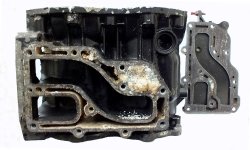No commercial product or other liquid substance can move salt crystals from a surface by the act of dissolving them. The salt crystals, in solution, must physically be moved off the surface at obvious exit points.
Salt crystals cooperate much better at being moved if they are dissolved. The major element required to move dissolved salt crystals off a surface is gravity. If a liquid containing dissolved salt crystals is not allowed to completely exit the surface by gravity, they will remain on the surface.
Because salt is soluble, it can be dissolved in almost any liquid. Water is the most common substance used to dissolve salt for many uses. Due to the unique characteristics of water, it has a difficult time moving dissolved salt crystals off a surface. One of the characteristics of water is its high level of surface tension. Water surface tension is evident when looking at a >bead= of water. It is the tension that holds the bead together. Salt crystals (and other soluble substances) dissolved in water attach themselves to the surface tension. Since water can evaporate, and salt cannot, the salt remains on surfaces long after the water evaporates.
Salt crystals are a mineral of the earth and cannot be destroyed. There is no other element of the earth or a product that can cause salt crystals (and other soluble minerals) to disappear or vanish from a surface by dissolving them. But they can be moved from place to place. In the effort to completely move salt from a surface by dissolving it in a Salt-Away solution, the salt must be moved while in solution either by pushing with pressure methods, by vacuuming or by gravity to exit the areas of the surface. After it is moved to another location, it will stay there until moved again by another force; air, water, humans, animals, nature.






















